Happy to announce 4.25.0.Final build for Eclipse 2022-09.
Downloads available at JBoss Tools 4.25.0.Final.
What is New?
Full info is at this page. Some highlights are below.
Happy to announce 4.25.0.Final build for Eclipse 2022-09.
Downloads available at JBoss Tools 4.25.0.Final.
Full info is at this page. Some highlights are below.
Happy to announce 4.25.0.AM1 (Developer Milestone 1) build for Eclipse 2022-09RC1.
Downloads available at JBoss Tools 4.25.0 AM1.
Full info is at this page. Some highlights are below.
Happy to announce 4.24.0.Final build for Eclipse 2022-06.
Downloads available at JBoss Tools 4.24.0.Final.
Full info is at this page. Some highlights are below.
When the new Quarkus project wizard was initially design, there were a few Quarkus extensions so it was not difficult to find one from the total list. Now that the Quarkus ecosystem is growing fast, it was difficult even of the extensions were grouped into categories.
In order to cope with this issue, the extensions and categories are now displayed in a tree (first level is categories, second level is extensions).
This new tree can now be filtered through a text field. If user enter some characters, only extensions matching this filter will be displayed in the tree.
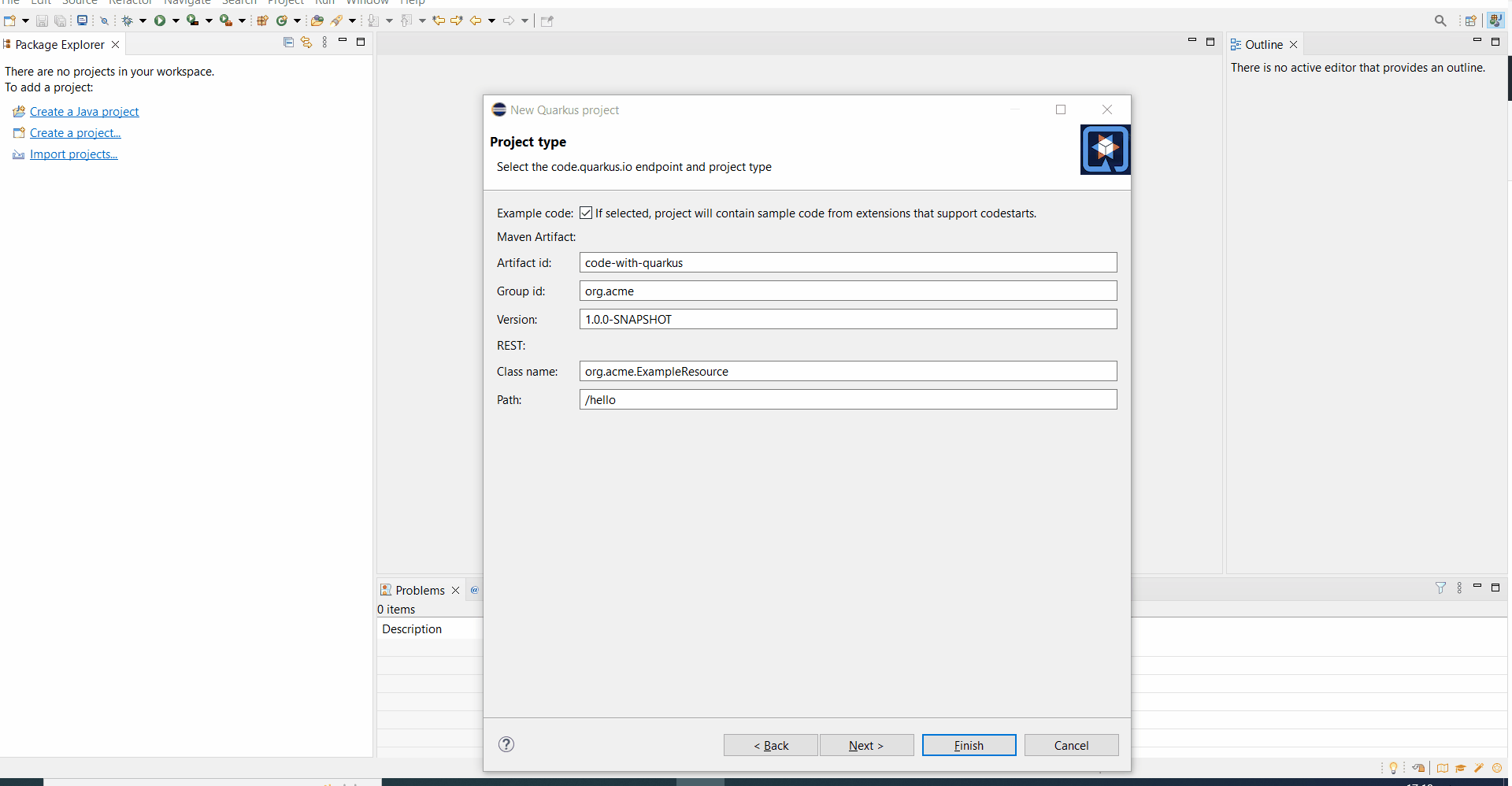
A number of additions and updates have been performed on the available Hibernate runtime providers.
The Hibernate 6.0 runtime provider (Preview) now incorporates Hibernate Core version 6.0.2.Final and Hibernate Tools version 6.0.2.Final.
The Hibernate 5.6 runtime provider now incorporates Hibernate Core version 5.6.9.Final and Hibernate Tools version 5.6.9.Final.
The Hibernate 5.3 runtime provider now incorporates Hibernate Core version 5.3.27.Final and Hibernate Tools version 5.3.27.Final.
Happy to announce 4.24.0.AM1 (Developer Milestone 1) build for Eclipse 2022-06M2.
Downloads available at JBoss Tools 4.24.0 AM1.
Full info is at this page. Some highlights are below.
When the new Quarkus project wizard was initially design, there were a few Quarkus extensions so it was not difficult to find one from the total list. Now that the Quarkus ecosystem is growing fast, it was difficult even of the extensions were grouped into categories.
In order to cope with this issue, the extensions and categories are now displayed in a tree (first level is categories, second level is extensions).
This new tree can now be filtered through a text field. If user enter some characters, only extensions matching this filter will be displayed in the tree.

A number of additions and updates have been performed on the available Hibernate runtime providers.
The Hibernate 6.0 runtime provider (Preview) now incorporates Hibernate Core version 6.0.2.Final and Hibernate Tools version 6.0.2.Final.
The Hibernate 5.6 runtime provider now incorporates Hibernate Core version 5.6.9.Final and Hibernate Tools version 5.6.9.Final.
The Hibernate 5.3 runtime provider now incorporates Hibernate Core version 5.3.26.Final and Hibernate Tools version 5.3.26.Final.
JBoss Tools 4.23.0 for Eclipse 2022-03 is here waiting for you. Check it out!
We highly recommand to download or update to this latest version.
The Red Hat CodeReady Studio product has reached end of life. The last release for the product was 12.21.3.GA. So there is no equivalent version of Red Hat CodeReady Studio for this version of JBoss Tools. Existing users of Red Hat CodeReady Studio can upgrade to this version of JBoss Tools.
For more information, see this article
JBoss Tools or Bring-Your-Own-Eclipse (BYOE) CodeReady Studio require a bit more:
This release requires at least Eclipse 4.23 (2022-03) but we recommend using the latest Eclipse 4.23 2022-03 JEE Bundle
since then you get most of the dependencies preinstalled.
|
Java11 is now required to run JBoss Tools (this is a requirement from Eclipse 4.17). So make sure to select a Java11 JDK in the installer. You can still work with pre-Java11 JDK/JRE and projects in the tool. |
Once you have installed Eclipse, you can either find us on the Eclipse Marketplace under "JBoss Tools".
You can also use our update site directly.
https://download.jboss.org/jbosstools/photon/stable/updates/
A number of additions and updates have been performed on the available Hibernate runtime providers.
The Hibernate 6.0 runtime provider (Preview) now incorporates Hibernate Core version 6.0.0.CR2 and Hibernate Tools version 6.0.0.CR2.
The Hibernate 5.6 runtime provider now incorporates Hibernate Core version 5.6.7.Final and Hibernate Tools version 5.6.7.Final.
The Hibernate 4.3 runtime provider now incorporates Hibernate Tools version 4.3.6.Final.
The Hibernate 3.6 runtime provider now incorporates Hibernate Tools version 3.6.2.Final.
The Hibernate 3.5 runtime provider now incorporates Hibernate Tools version 3.5.3.Final.
Qute templates support has been added. This allows Quarkus developers to get enhanced editing experience to Qute templates located in their projects.
A Qute template is any file located under src/main/resources/templates and with the html, yaml, yml, json or txt extension.
Qute support is enabled on any project that has a dependency on the Qute library.
You can generate a Qute enabled project with the Quarkus project wizard and choosing the RESTEasy Classic Qute extension
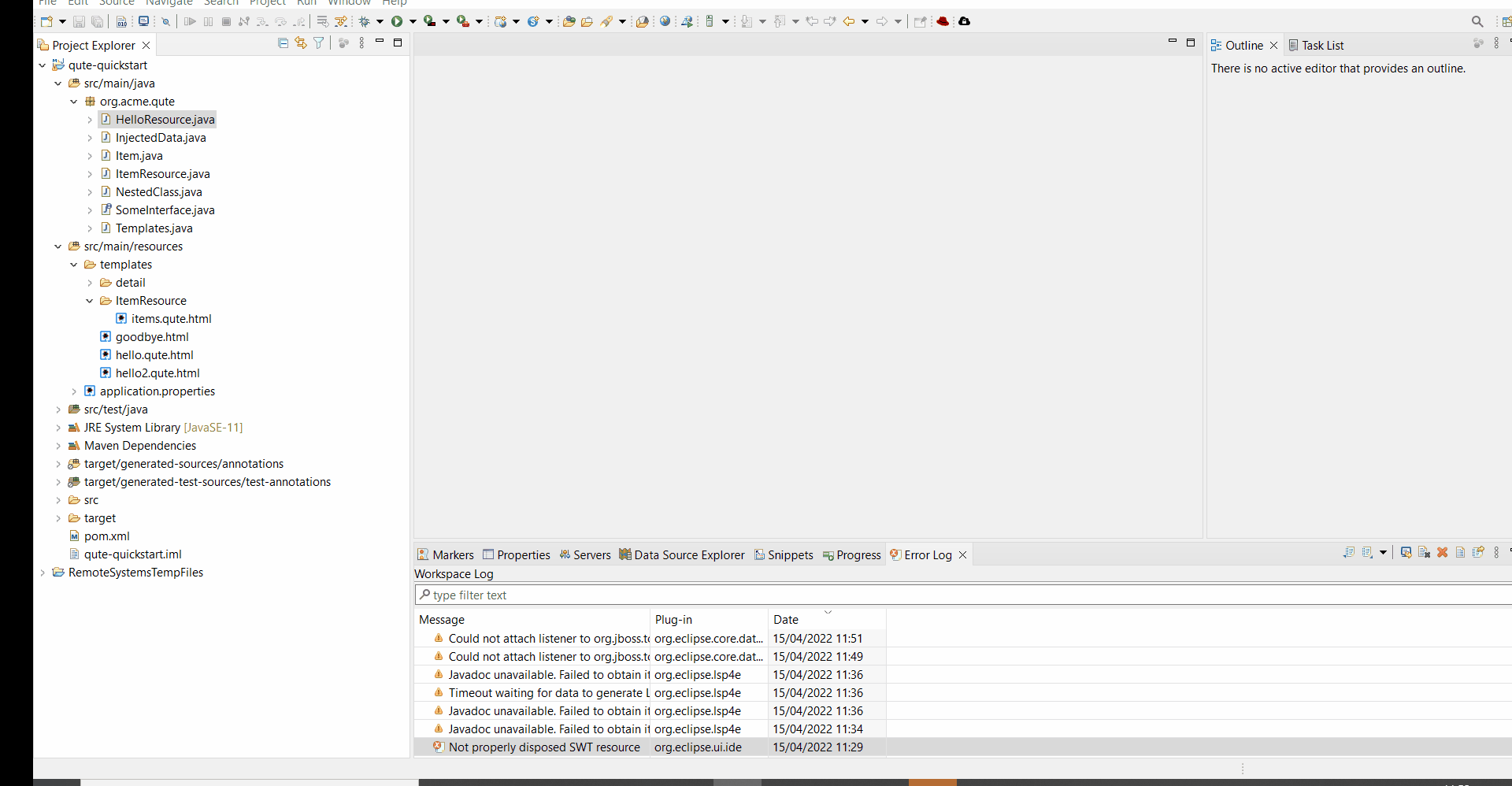
Features included into the Qute support are:
Integration between Java files and Qute templates files
Method parameter support in Qute template files
Java Type Hover Support for Qute Templates
Linked Editing Range Support in Qute Templates
Qute Section Completion
Support for Qute Validation
Completion for Qute Value Resolvers
Support for @TemplateExtension Methods
Support for Directly Injecting Beans into Qute Templates
Any reference to a Qute template file from a Java file show the option to generate the Qute template file (if the Qute template file has not been found in the project) or navigate to the Qute template file.
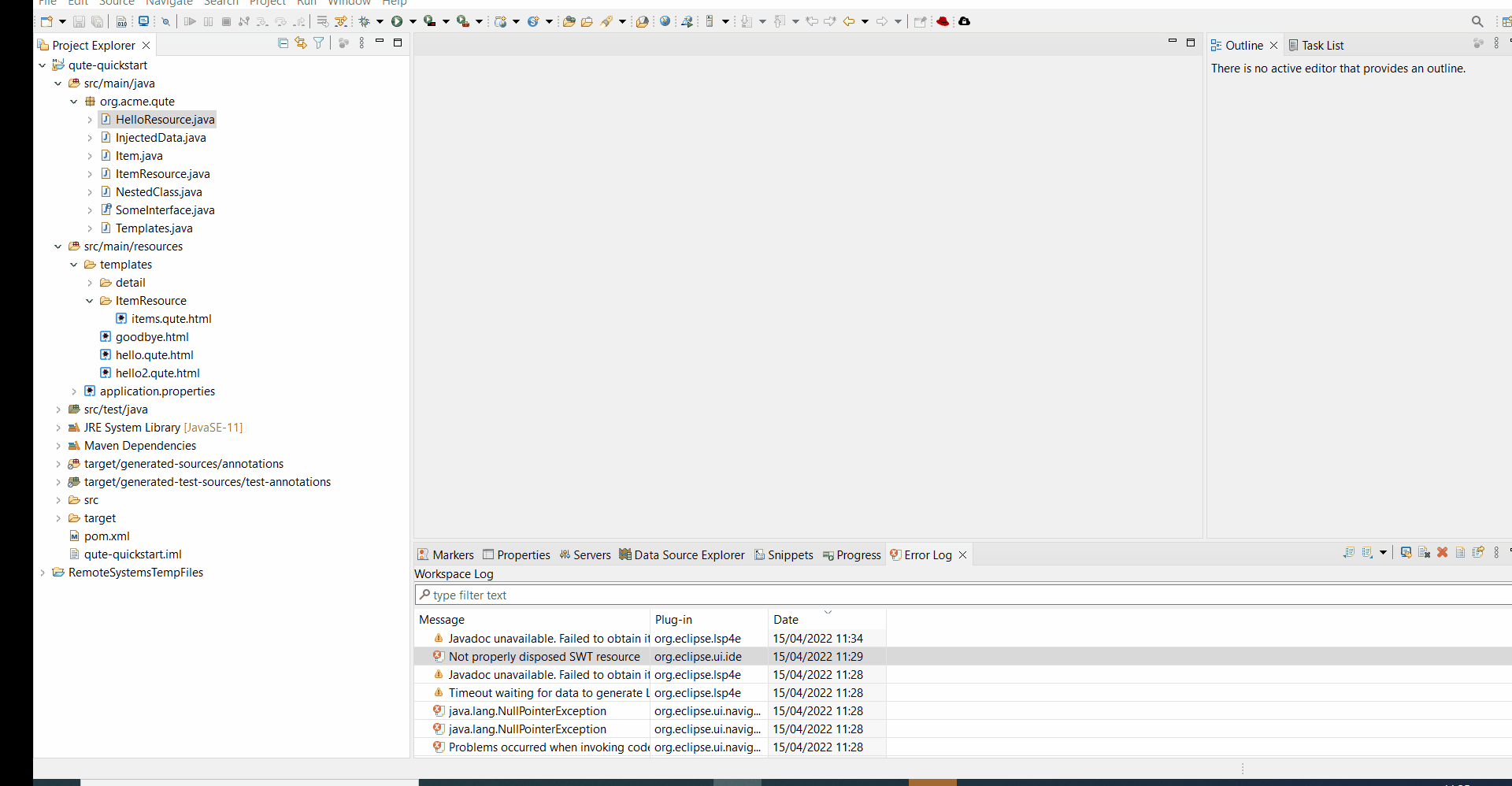
The Qute language server has support for built-in and user-defined Java classes, including parameter completion and validation for their methods. Take advantage of this to easily avoid Java related mistakes.
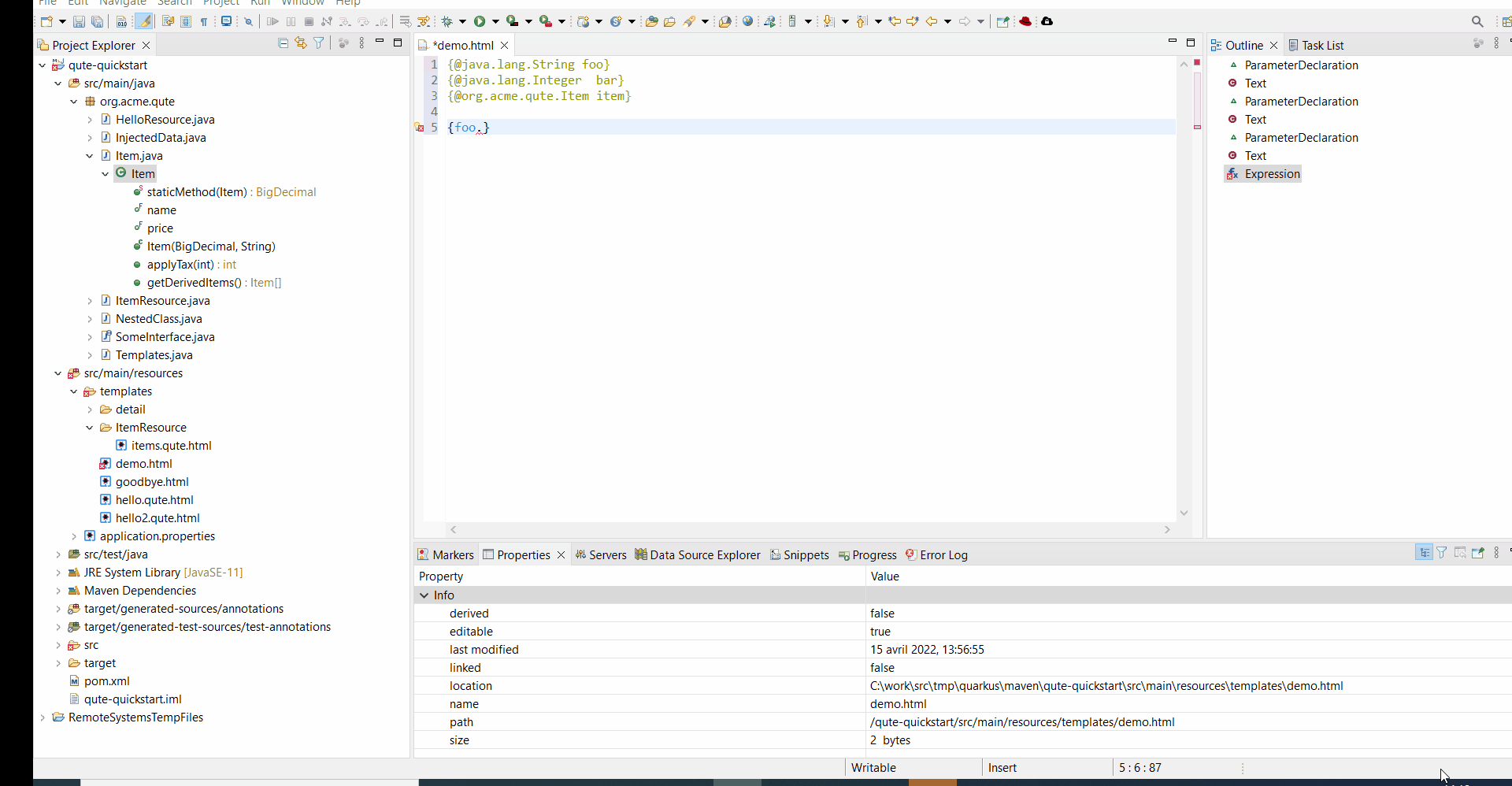
When hovering over an expression in a Qute template, the Java type (built-in or user defined) will be displayed.
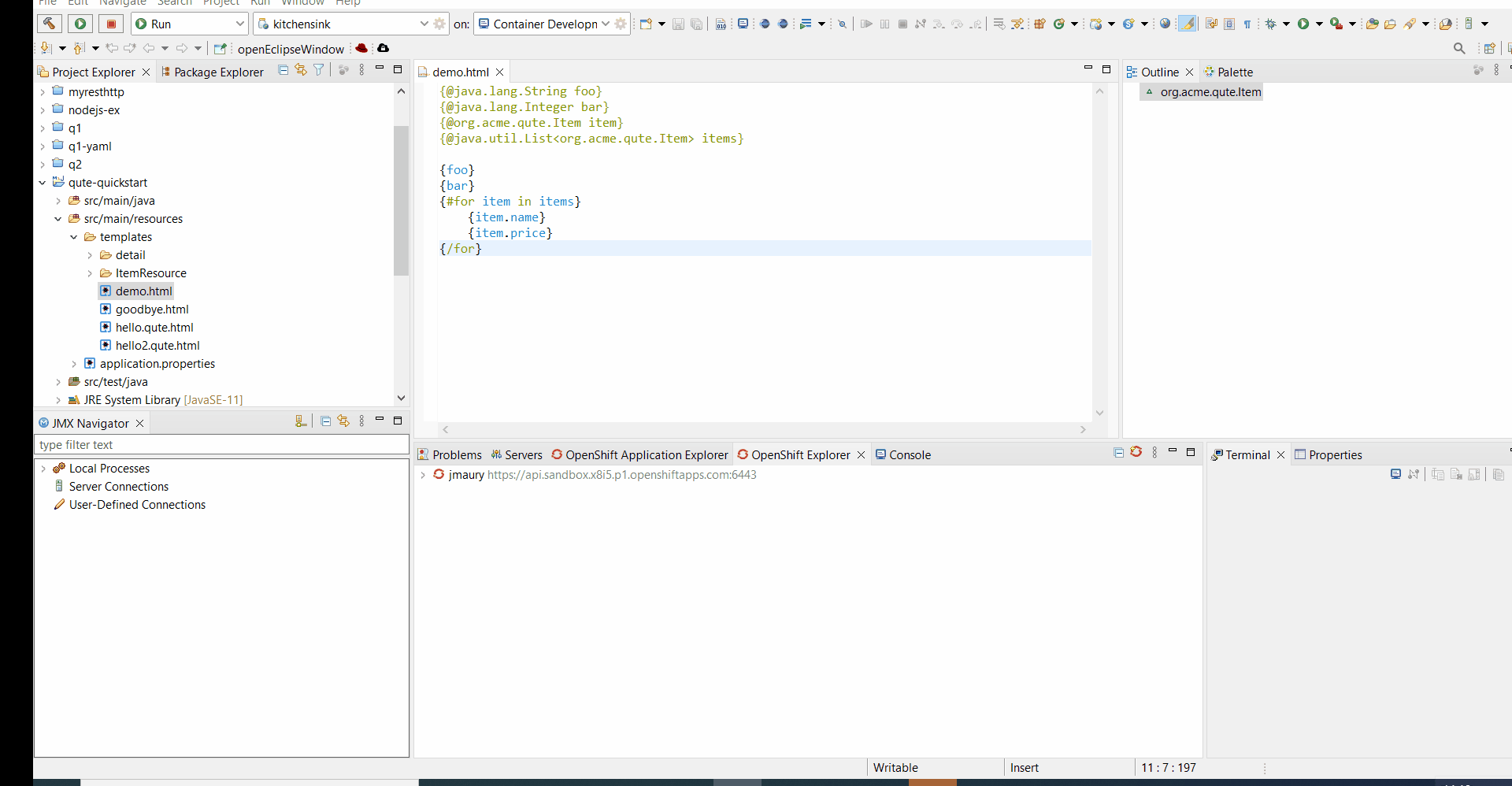
Similar to most language, linked editing is now supported for Qute templates , allowing for simultaneous renaming of multiple parameter expressions.
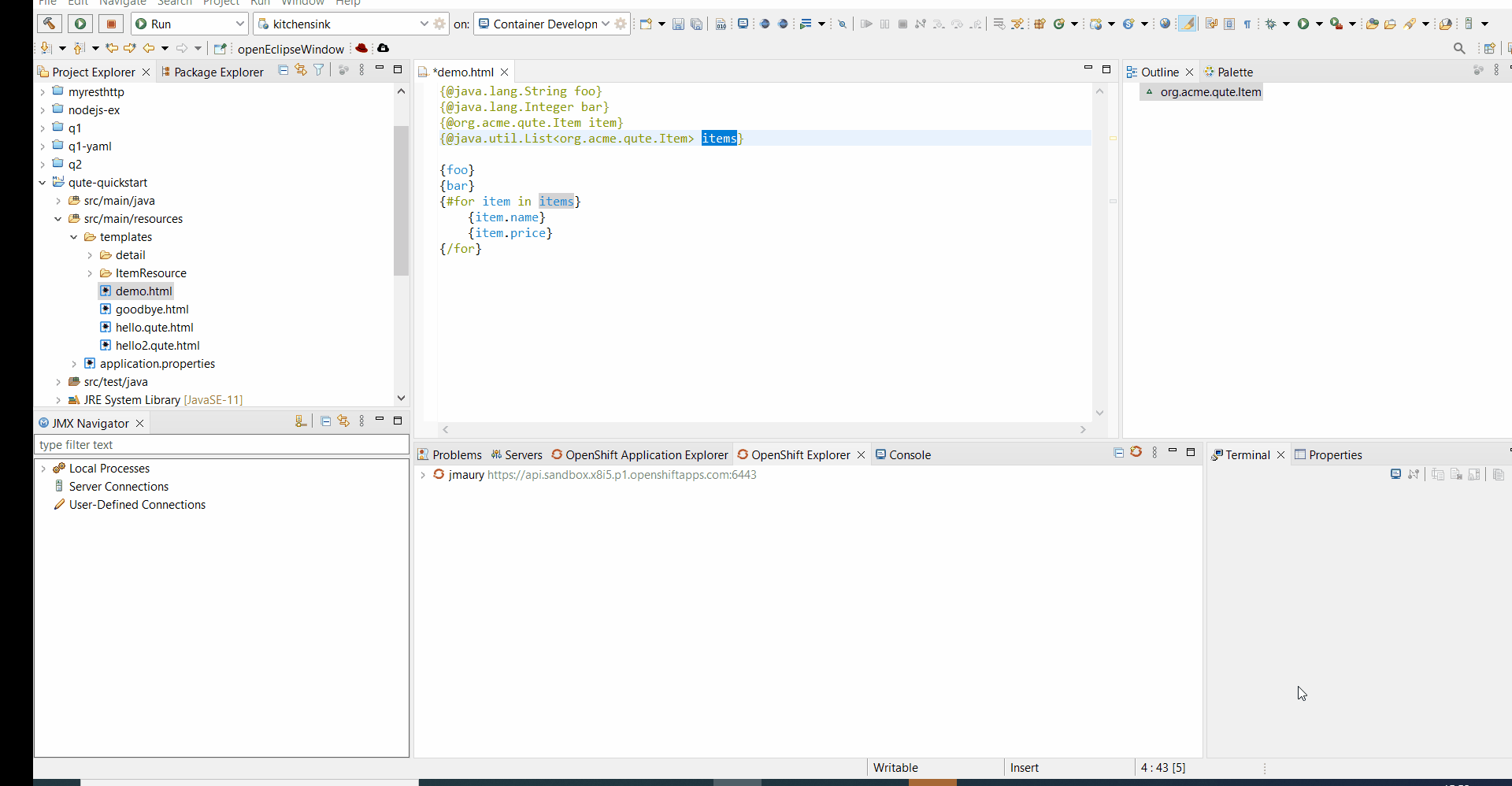
Qute templates use sections in its templating language to power any logic required when compiling and displaying the resulting document. To support this, the extension’s Qute support populates a completion list with all available Qute sections, along with any parameters they take and a small code snippet of its usage.
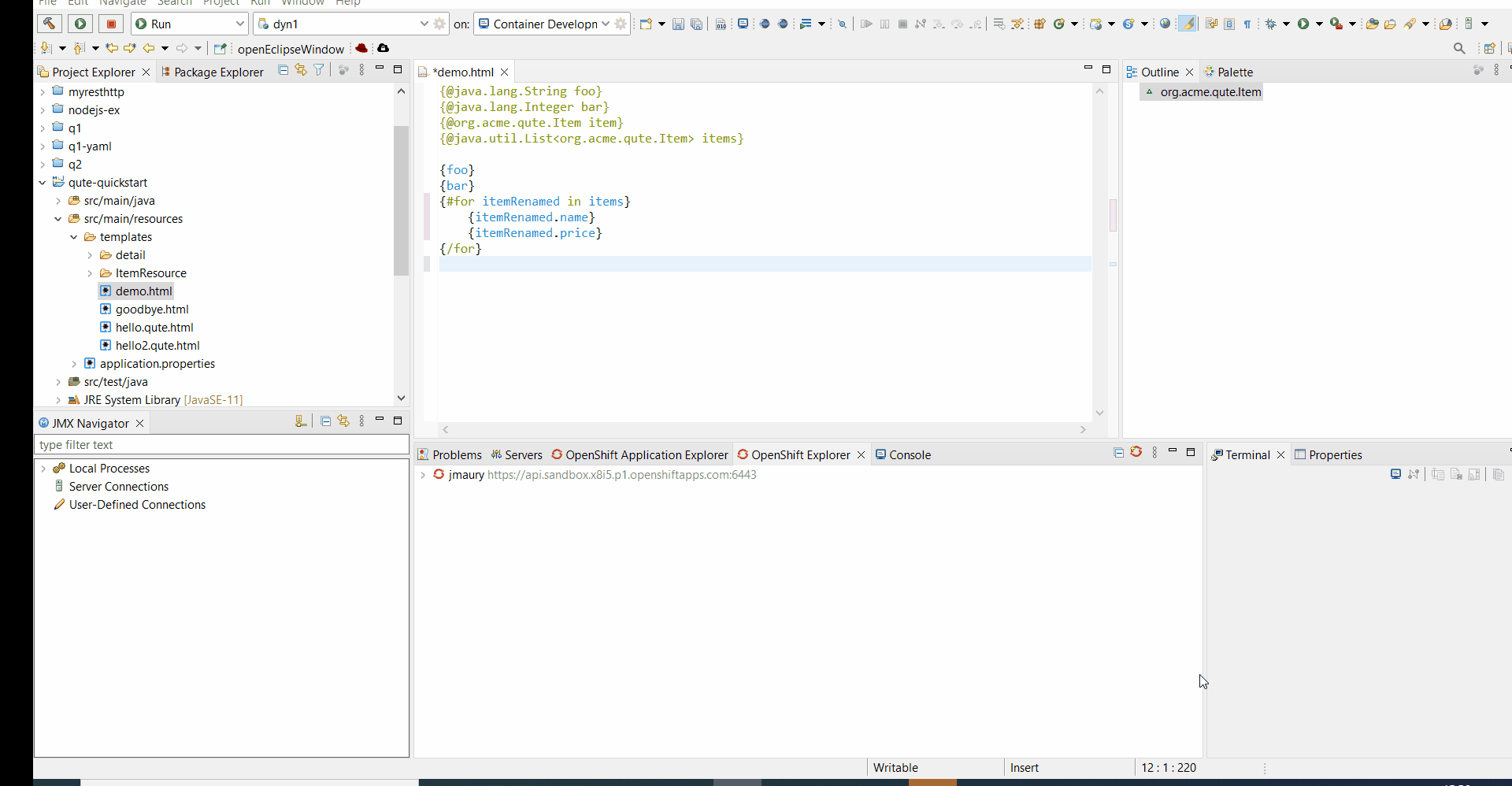
Java and Qute validation is included for Qute templates with Quarkus Tools, including diagnostics and quick fix suggestions.
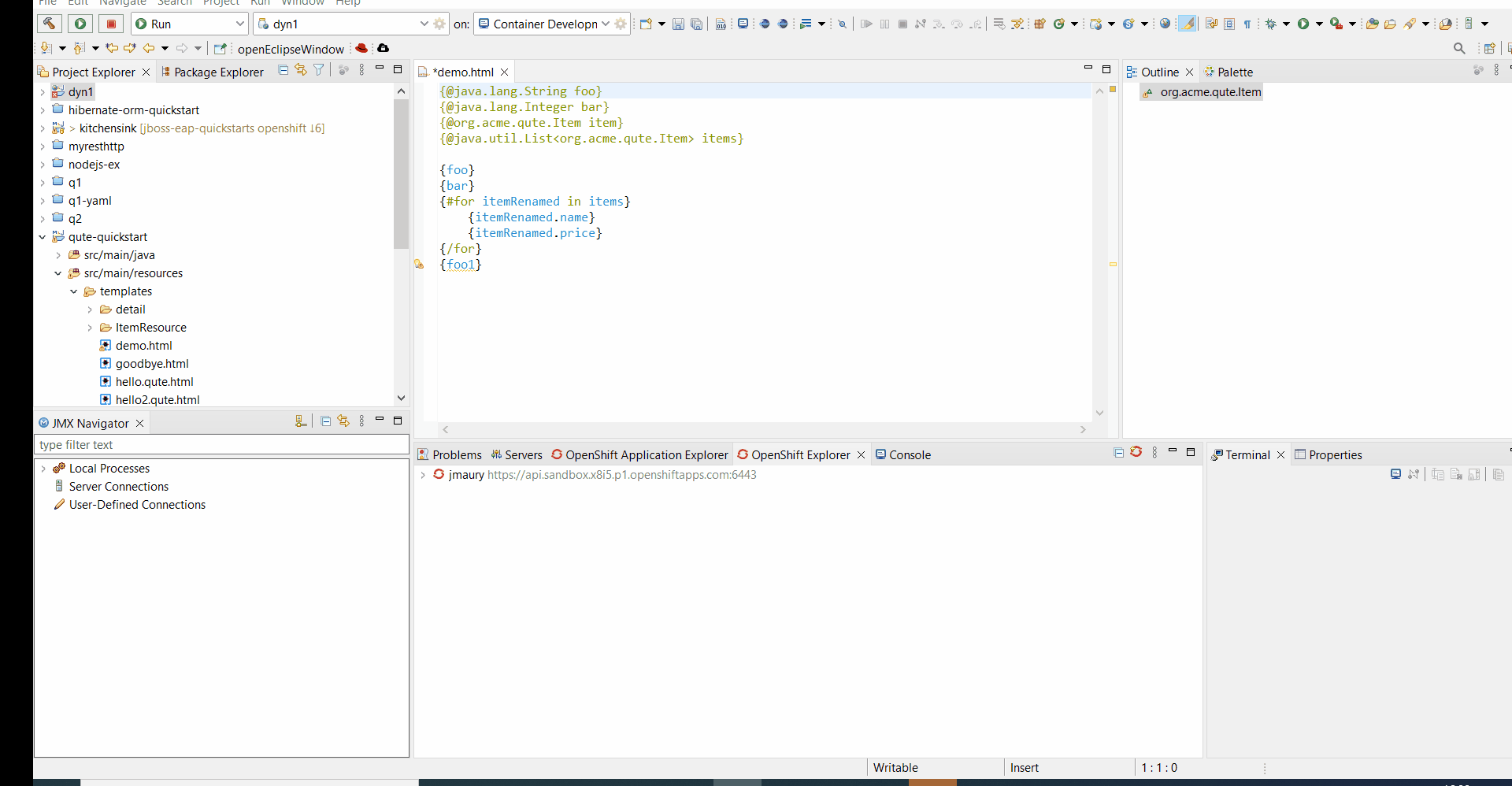
The developer has the ability to disable this validation in their settings through the Window → Preferences → JBoss Tools → Qute.
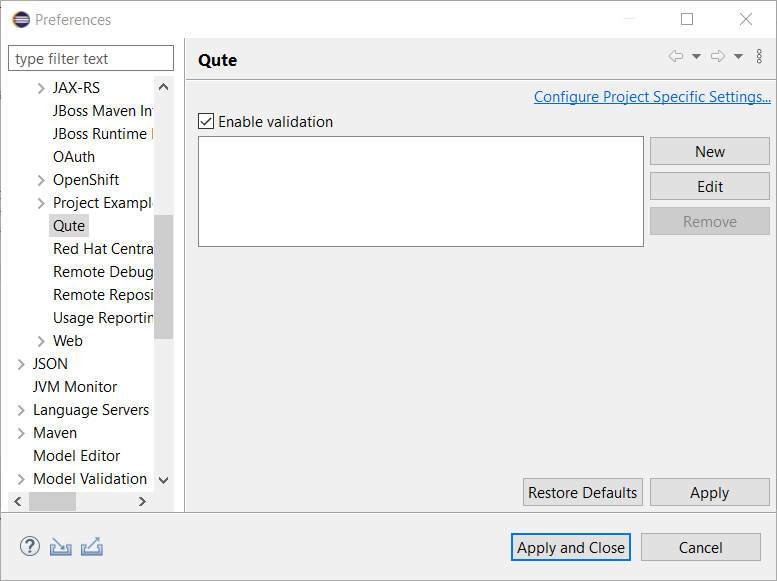
The second table contains a list of Qute templates (as regular expressions) for which validation will be excluded.
If any of the available validation is disturbing your development, you can disable Qute validation for the file project with a single click, using a “Quick Fix” that appears on every Qute related diagnostic
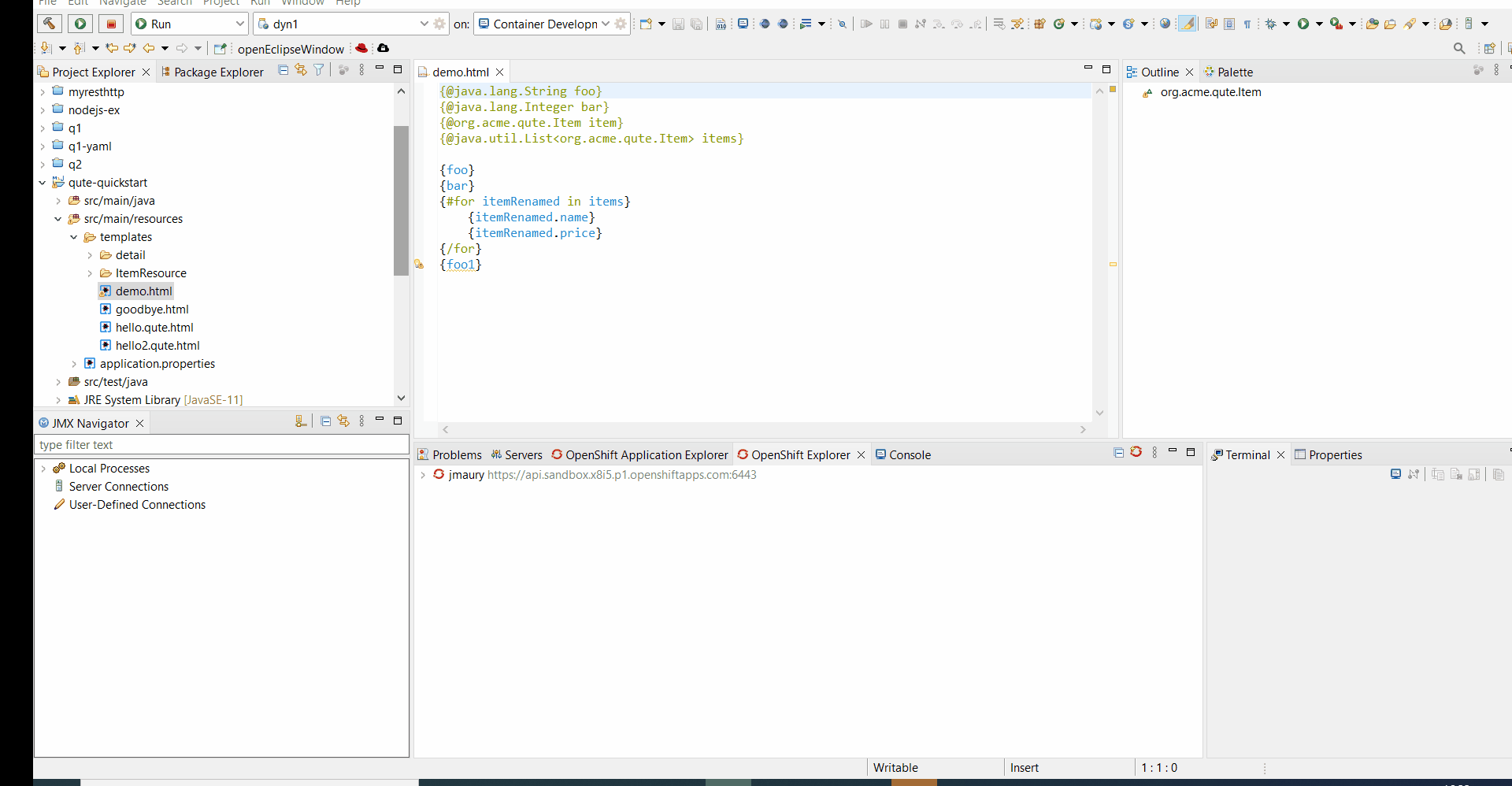
Paired with corresponding Java methods, built-in Java classes also have built-in Qute value resolvers made available by the Qute templating engine that is evaluated and outputs, or resolves to, a value. Quarkus Tools supports completion, hover and snippet generation for these built-in value resolvers.
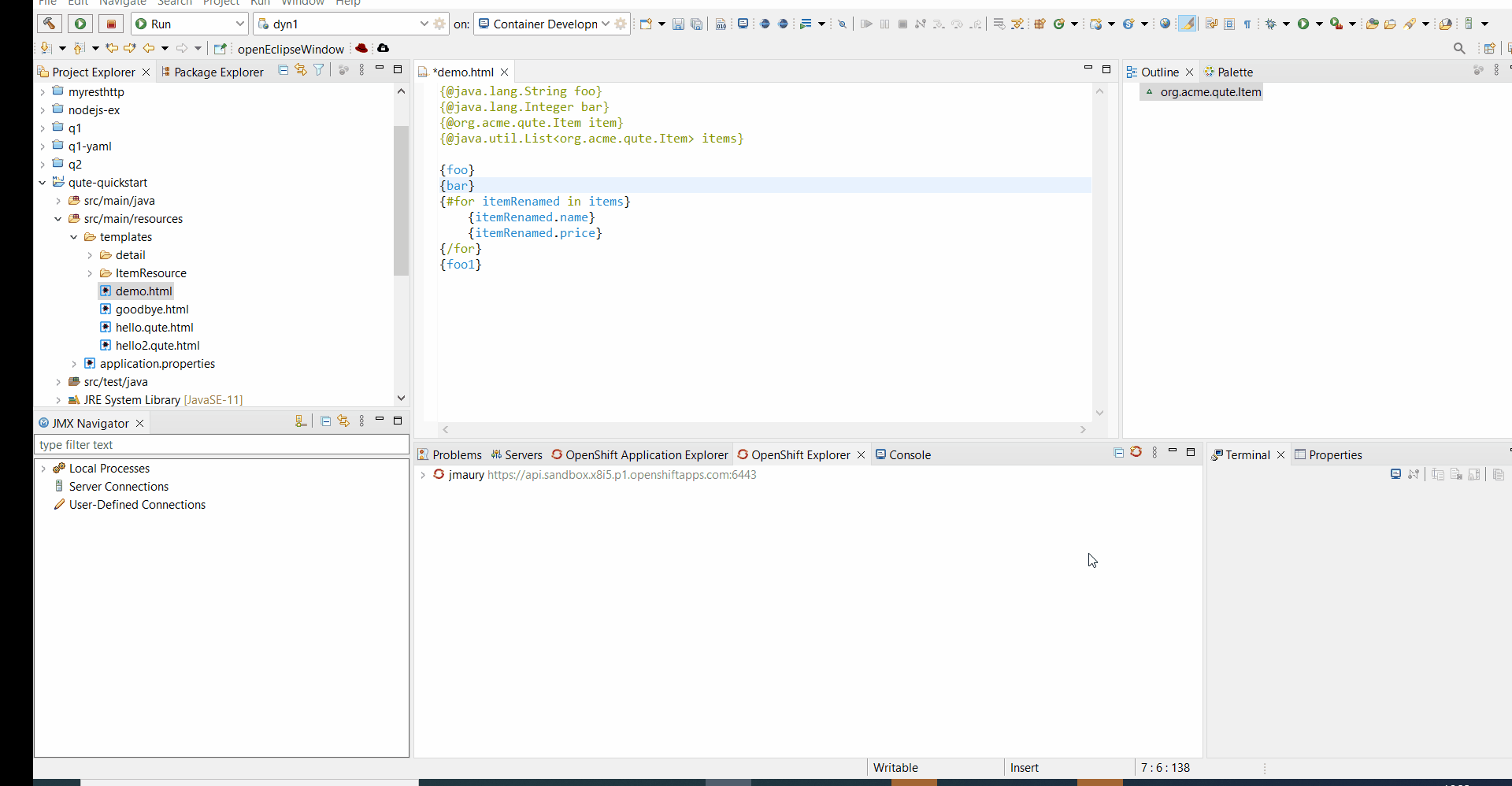
You can find more noteworthy updates in on this page.
Happy to announce 4.23.0.AM1 (Developer Milestone 1) build for Eclipse 2022-03RC1.
Downloads available at JBoss Tools 4.23.0 AM1.
Full info is at this page. Some highlights are below.
JBoss Tools 4.21.3 and Red Hat CodeReady Studio 12.21.3 for Eclipse 2021-09 are here waiting for you. Check it out!
We’ve released new versions of JBoss Tools and Red Hat CodeReady Studio that switches the version of Apache Log4j to 2.17.1.
We highly recommand to download or update to this latest version.
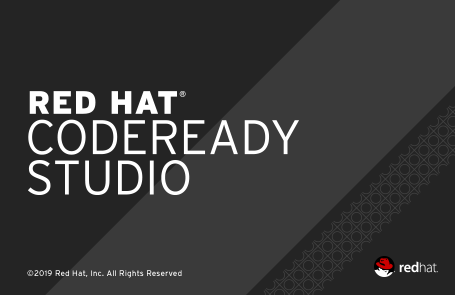
Red Hat CodeReady Studio comes with everything pre-bundled in its installer. Simply download it from our Red Hat CodeReady product page and run it like this:
java -jar codereadystudio-<installername>.jar
JBoss Tools or Bring-Your-Own-Eclipse (BYOE) CodeReady Studio require a bit more:
This release requires at least Eclipse 4.21 (2021-09) but we recommend using the latest Eclipse 4.21 2021-09 JEE Bundle
since then you get most of the dependencies preinstalled.
|
Java11 is now required to run Red Hat Developer Studio or JBoss Tools (this is a requirement from Eclipse 4.17). So make sure to select a Java11 JDK in the installer. You can still work with pre-Java11 JDK/JRE and projects in the tool. |
Once you have installed Eclipse, you can either find us on the Eclipse Marketplace under "JBoss Tools" or "Red Hat CodeReady Studio".
For JBoss Tools, you can also use our update site directly.
http://download.jboss.org/jbosstools/photon/stable/updates/
The platform now embeds Apache Log4j 2.17.1.
So the following CVEs:
CVE-2021-44228
CVE-2021-45046
CVE-2021-45105
CVE-2021-44832
have been fixed.
As Apache Log4j 1.x is also embedded but is not maintained anymore, the Apache Log4j bundle (1.2.15) has been patched in order to remove:
JMSSink
JBDCAppender
Chainsaw
A number of additions and updates have been performed on the available Hibernate runtime providers.
The Hibernate 6.0 runtime provider (Preview) now incorporates Hibernate Core version 6.0.0.Beta2 and Hibernate Tools version 6.0.0.Beta2.
The Hibernate 5.6 runtime provider now incorporates Hibernate Core version 5.6.3.Final and Hibernate Tools version 5.6.3.Final.
The Hibernate 5.5 runtime provider now incorporates Hibernate Core version 5.5.9.Final and Hibernate Tools version 5.5.9.Final.
The Hibernate 5.4 runtime provider now incorporates Hibernate Core version 5.4.33.Final and Hibernate Tools version 5.4.33.Final.
The Hibernate 5.3 runtime provider now incorporates Hibernate Core version 5.3.25.Final and Hibernate Tools version 5.3.25.Final.
The Hibernate 5.2 runtime provider now incorporates Hibernate Core version 5.2.13.Final and Hibernate Tools version 5.2.13.Final.
The Hibernate 5.1 runtime provider now incorporates Hibernate Core version 5.1.12.Final and Hibernate Tools version 5.1.12.Final.
The Hibernate 5.0 runtime provider now incorporates Hibernate Core version 5.0.7.Final and Hibernate Tools version 5.0.7.Final.
You can find more noteworthy updates in on this page.
A remote code execution vulnerability in the Apache Log4j 2 Java library when using a JDBC Appender with a JNDI LDAP data source URI (see https://logging.apache.org/log4j/2.x/index.html#News or https://nvd.nist.gov/vuln/detail/CVE-2021-44832) has been releaved to the public audience on Tuesday Dec 28th, 2021.
A denial of service vulnerability in the Apache Log4j 2 Java library (see https://logging.apache.org/log4j/2.x/index.html#News or https://nvd.nist.gov/vuln/detail/CVE-2021-45105) has been releaved to the public audience on Thursday Dec 30th, 2021.
We’ve released new versions of JBoss Tools and Red Hat CodeReady Studio that switches the version of Apache Log4j to 2.17.1.
We highly recommand to download or update to this latest version.

Red Hat CodeReady Studio comes with everything pre-bundled in its installer. Simply download it from our Red Hat CodeReady product page and run it like this:
java -jar codereadystudio-<installername>.jar
JBoss Tools or Bring-Your-Own-Eclipse (BYOE) CodeReady Studio require a bit more:
This release requires at least Eclipse 4.21 (2021-09) but we recommend using the latest Eclipse 4.21 2021-09 JEE Bundle
since then you get most of the dependencies preinstalled.
|
Java11 is now required to run Red Hat Developer Studio or JBoss Tools (this is a requirement from Eclipse 4.17). So make sure to select a Java11 JDK in the installer. You can still work with pre-Java11 JDK/JRE and projects in the tool. |
Once you have installed Eclipse, you can either find us on the Eclipse Marketplace under "JBoss Tools" or "Red Hat CodeReady Studio".
For JBoss Tools, you can also use our update site directly.
http://download.jboss.org/jbosstools/photon/stable/updates/
Happy to announce 4.21.2.AM1 (Developer Milestone 1) build for Eclipse 2021-09.
Downloads available at JBoss Tools 4.21.2.AM1.
Full info is at this page. Some highlights are below.
When a new Quarkus project/module is to be generated, it is now possible to select the Quarkus stream (see this article) on which the generated application will be based on.
By default, the recommended (latest release) will be selected but you can choose another one:
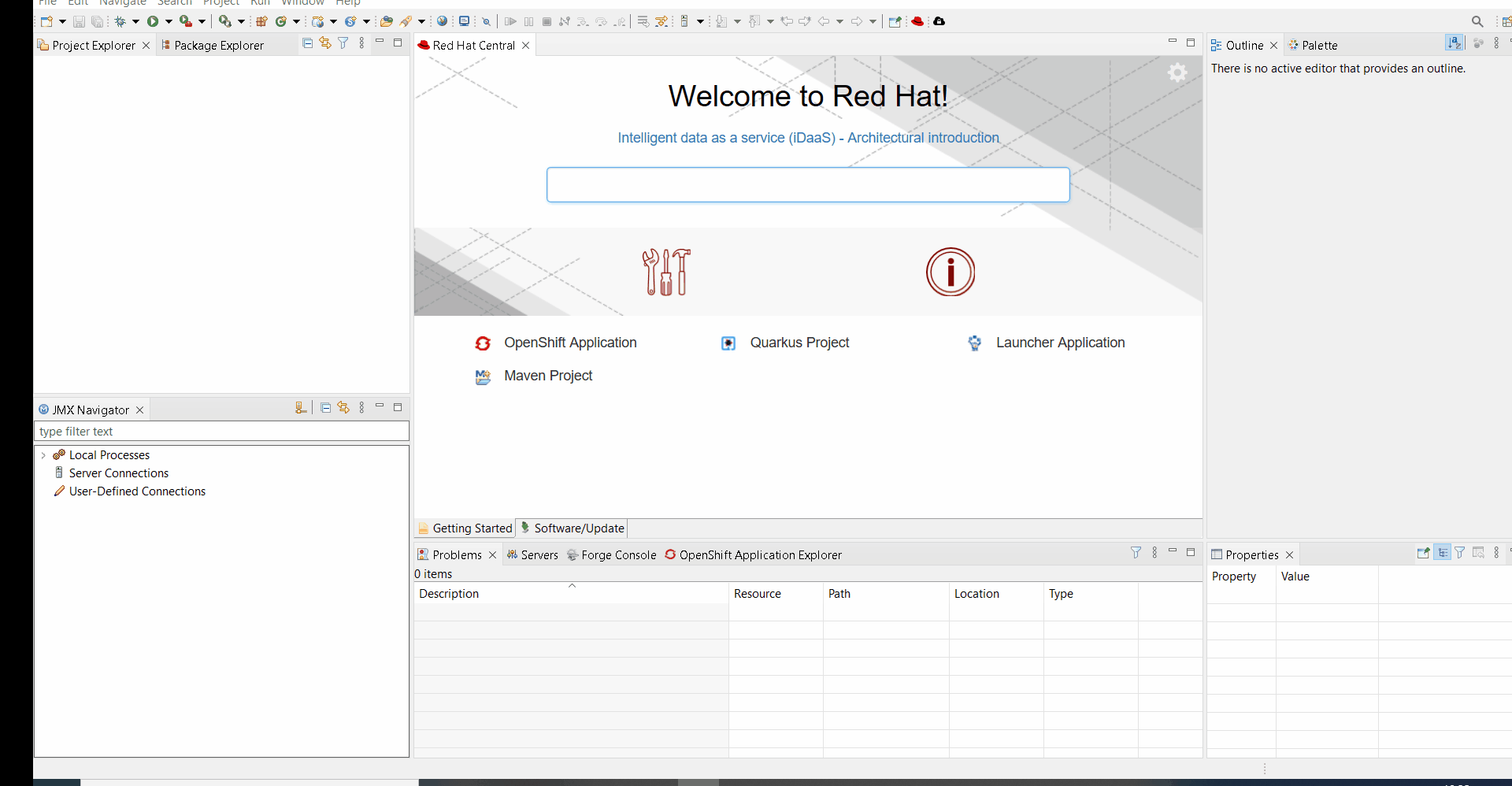
When you want to define a fallback method thanks to the @Fallback annotation from MicroProfile Fault Tolerance, the code completion is activated on the fallbackMethod member and will propose you available target methods.
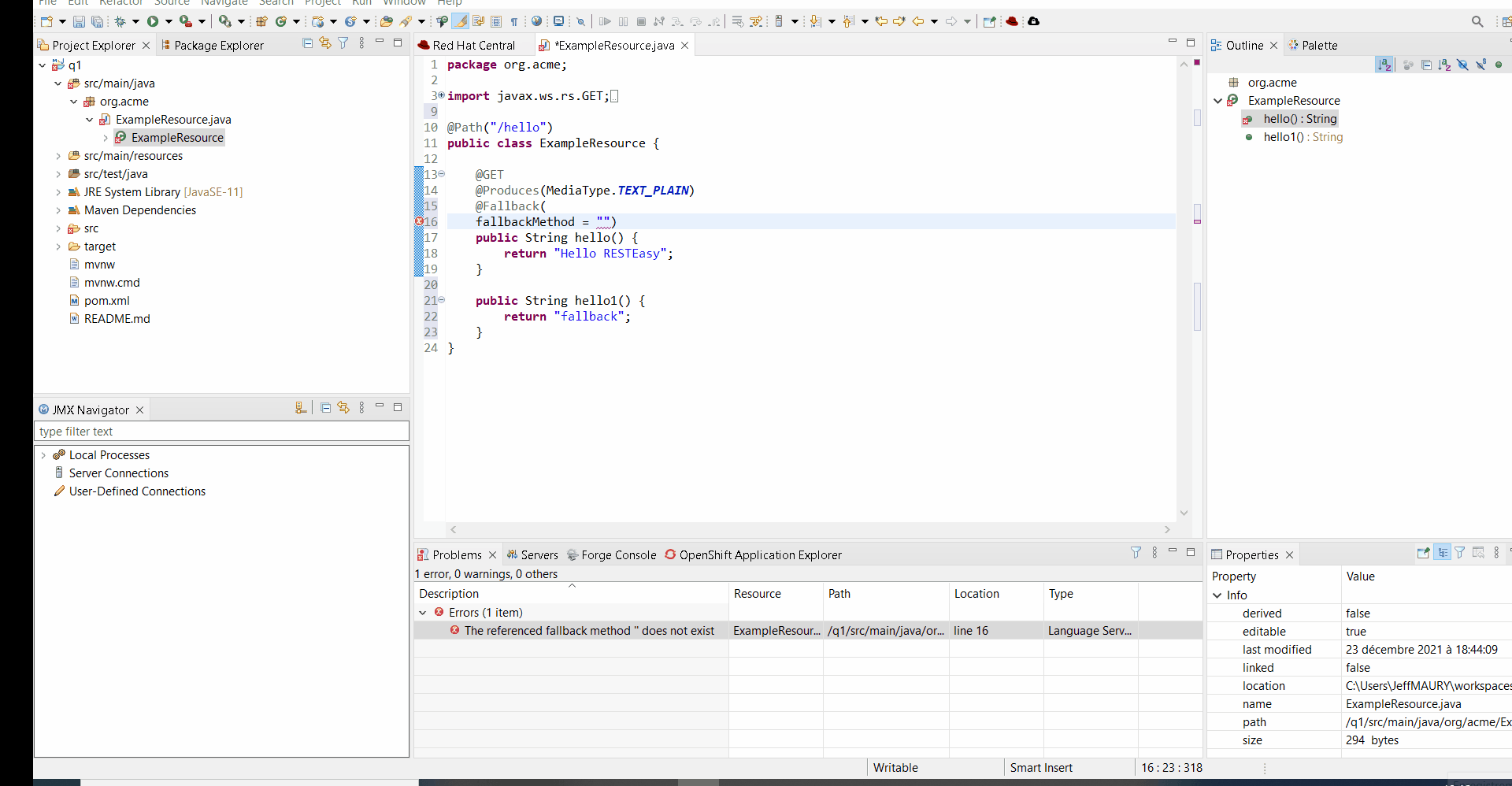
When you define a Quarkus launch/debug configuration, it is linked to a specific project from your workspace. If this project has a dependency on another project from the workspace, it will be resolved against the workspace and you don’t have to install the dependency in the local Maven/Gradle cache so that it can be resolved.
A number of additions and updates have been performed on the available Hibernate runtime providers.
The Hibernate 5.6 runtime provider now incorporates Hibernate Core version 5.6.1.Final and Hibernate Tools version 5.6.1.Final.
The Hibernate 5.4 runtime provider now incorporates Hibernate Core version 5.4.8.Final and Hibernate Tools version 5.4.8.Final.
The Hibernate 5.3 runtime provider now incorporates Hibernate Core version 5.3.24.Final and Hibernate Tools version 5.3.24.Final.
Enjoy!
Jeff Maury
A remote code execution vulnerability in the Apache Log4j 2 Java library dubbed Log4Shell (see https://logging.apache.org/log4j/2.x/index.html#News or https://nvd.nist.gov/vuln/detail/CVE-2021-44228) has been releaved to the public audience on Friday Dec 9th, 2021.
We’ve released new versions of JBoss Tools and Red Hat CodeReady Studio that switches the version of Apache Log4j to 2.16.0.
We highly recommand to download or update to this latest version.

Red Hat CodeReady Studio comes with everything pre-bundled in its installer. Simply download it from our Red Hat CodeReady product page and run it like this:
java -jar codereadystudio-<installername>.jar
JBoss Tools or Bring-Your-Own-Eclipse (BYOE) CodeReady Studio require a bit more:
This release requires at least Eclipse 4.21 (2021-09) but we recommend using the latest Eclipse 4.21 2021-09 JEE Bundle
since then you get most of the dependencies preinstalled.
|
Java11 is now required to run Red Hat Developer Studio or JBoss Tools (this is a requirement from Eclipse 4.17). So make sure to select a Java11 JDK in the installer. You can still work with pre-Java11 JDK/JRE and projects in the tool. |
Once you have installed Eclipse, you can either find us on the Eclipse Marketplace under "JBoss Tools" or "Red Hat CodeReady Studio".
For JBoss Tools, you can also use our update site directly.
http://download.jboss.org/jbosstools/photon/stable/updates/